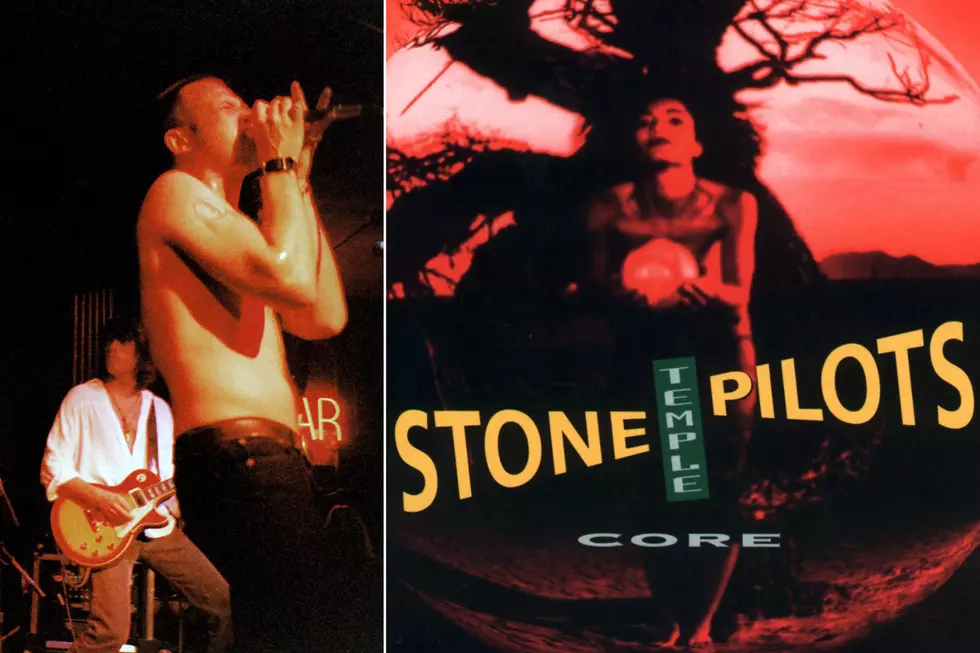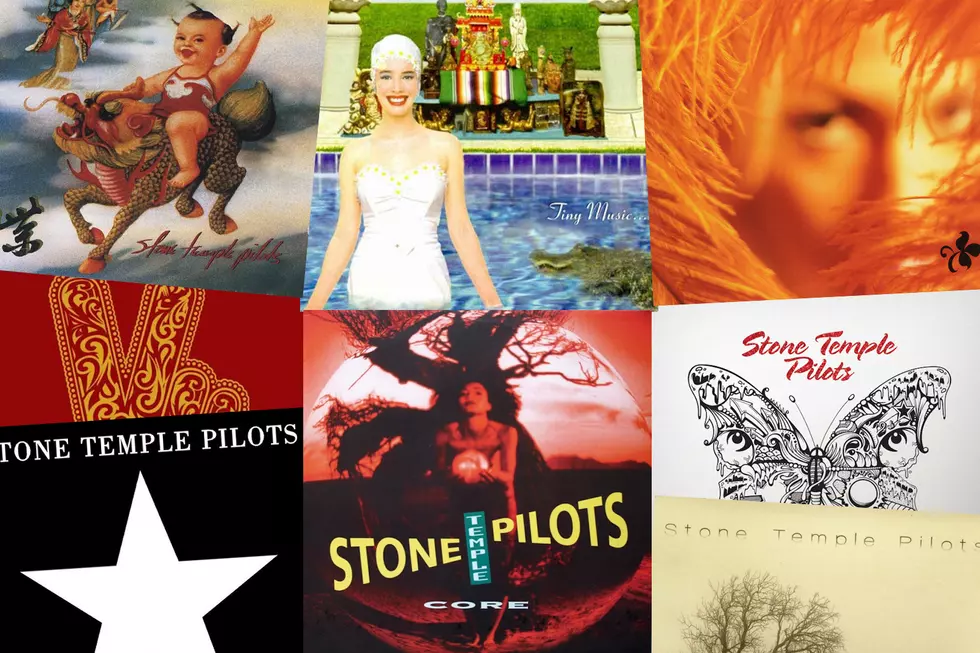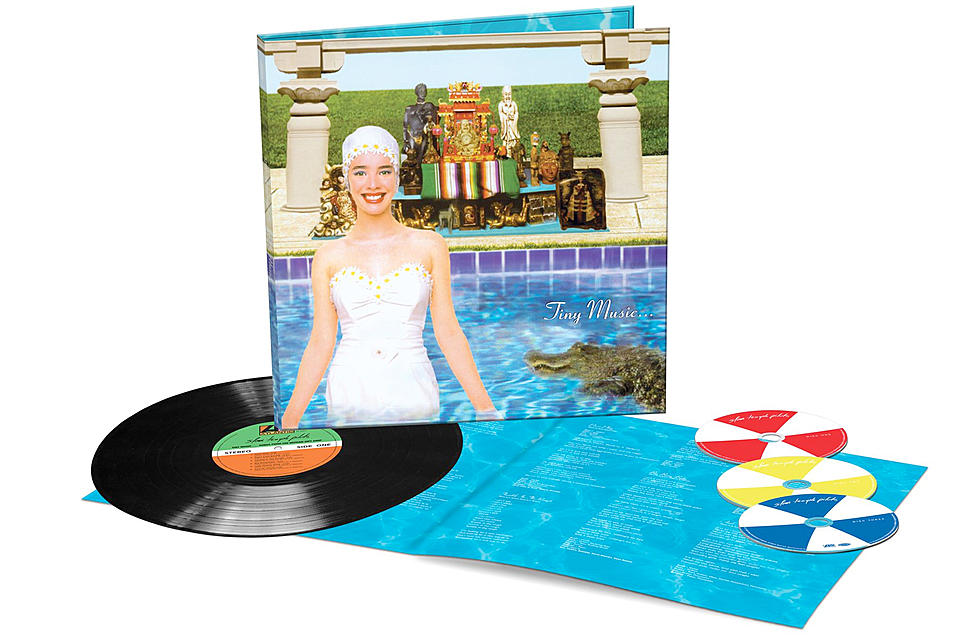
30 Years Ago: ‘Core’ Permanently Dooms Stone Temple Pilots’ Reputation
"Be careful what you wish for, lest it come true!"
So said Aesop's Fables, and so learned Stone Temple Pilots after the release of their multiplatinum 1992 debut album Core, which simultaneously turned them into the biggest and most hated rock band in the world — while dooming their critical reputation for good.
To be fair, they gave critics a good bit of cannon fodder on their first go-round.
The nucleus of Stone Temple Pilots dates back to 1984, when bassist Robert DeLeo moved from Montclair, N.J., to Los Angeles with a head full of dreams. He quickly met Scott Weiland, a singer with macho, frat-boy energy and a devilish wild side. DeLeo joined Weiland’s band Soi-Disant, also featuring guitarist Corey Hickok, and they soon added drummer Eric Kretz and rechristened themselves Swing.
Weiland, DeLeo and Kretz eventually sought a replacement for Hickok, and DeLeo invited his older brother Dean — a former aspiring musician who was working as a contractor and pushing 30 — to come up from San Diego to cut some tracks.
"I played a couple of solos, and I think it was then and there where Scott really took a look at what he wanted the future to be, and what the realm of guitar in what he was doing wanted to be," Dean DeLeo told UCR in 2021. "It wasn't too long after that they asked me. They said, 'Hey, do you want to be in the band?'"
With a soon-to-be-classic lineup in place, the reconstituted Swing changed their name to Mighty Joe Young. The band cut a demo and gigged heavily around Los Angeles and San Diego in the early '90s, eventually catching the eye of Atlantic Records A&R executive Tom Carolan during a gig at the Shamrock in East Hollywood. Carolan offered them a record deal and suggested a name change, resulting in Stone Temple Pilots, an homage to Weiland's childhood infatuation with STP motor oil and lubricants. (The band reportedly shot down his initial suggestion of Shirley Temple's Pussy.)
Stone Temple Pilots entered Los Angeles' Rumbo Recorders in late 1991 to begin working on Core with producer Brendan O'Brien, hot off the heels of engineering the Black Crowes' Shake Your Money Maker and mixing Pearl Jam's Ten. They walked out of the studio in early 1992 with a dozen red-blooded, all-American alt-rock anthems engineered for rock radio and MTV supremacy.
Watch Stone Temple Pilots' 'Plush' Video
It wouldn't take long for them to fulfill their destiny: Core hit shelves on Sept. 29, 1992; by the following summer, it had peaked at No. 3 on the Billboard 200 and earned a platinum certification from the RIAA. The LP spawned a No. 1 hit on Billboard's Mainstream Rock Airplay chart in the megalithic pop-rock stomper "Plush" and a No. 2 hit in the brooding acoustic ballad "Creep." But along with its meteoric success, Core also earned scathing reviews from critics, who wrote off Stone Temple Pilots as cut-rate grunge clones.
They took specific aim at Weiland, chalking up his baritone wail to Eddie Vedder cosplay and his twangy, affected croon to Kurt Cobain worship. STP's original sin, it seemed, was hailing from sunny California instead of the doom-and-gloom grunge capital of Seattle.
None of it mattered. The more critics savaged Stone Temple Pilots, the more records they seemed to sell, and Core ultimately moved more than 8 million units in the United States alone. The schism was most apparent when Rolling Stone named STP Worst New Band in their 1994 critics' poll, while fans voted them Best New Band in the same issue.
In retrospect, critics might have been too harsh, but they weren't off-base. Core is far from a flawless debut. Its album cuts tend to meander ("Sin," "Where the River Goes") or thrash without much melody or nuance ("Naked Sunday"), and the minute-and-a-half interludes "No Memory" and "Wet My Bed" are needless filler. During the LP's best moments, however, Stone Temple Pilots can go toe-to-toe with the biggest and best bands of the era. Songs like "Plush," "Wicked Garden" and "Crackerman" pack supersized hooks and smoldering guitar riffs, while "Dead & Bloated" and "Piece of Pie" serve obliterative slices of alt-metal à la Alice in Chains.
"Sex Type Thing," with its singsong vocals and descending guitar riff inspired by Led Zeppelin's "In the Light," contends for the catchiest song on Core — and was also its most misunderstood. Weiland sings the song from the point of view of a rapist, delivering lines like, "I am a man, a man / I'll give you something that you won't forget / I said you shouldn't have worn that dress." The lyrics are meant to be a clear disavowal of sexual assault, but critics who took the song at face value (or simply had an ax to grind) instead accused Weiland of glorifying rape culture.
Watch Stone Temple Pilots' 'Sex Type Thing' Video
This dissonance became apparent at shows as "Sex Type Thing" gained traction and Stone Temple Pilots' star began to rise.
"The story about it being an anti-date rape song was well known," Weiland told Spin in 2011, "but there were a couple of shows where I would wear a granny's dress from the '60s, and these big huge jocks were moshing. They didn't even notice the message in the song. ... So it really bums me out when I see people moshing to that song. It's basically the opposite of what we had in mind when we wrote it."
Stone Temple Pilots worked hard to shed their poser and copycat labels, turning down an opening slot on Aerosmith's mammoth Get a Grip tour to embark on a more intimate run with alt-rocker veterans Butthole Surfers and Firehose. It was less a display of integrity than a successful bet on themselves: By the end of 1993, STP was headlining arenas and amphitheaters around the United States.
Even though Core turned them into rock 'n' roll heavyweights, the critics bruised Stone Temple Pilots mightily, and they carried a chip on their shoulder when re-entering the studio to begin work on their 1994 sophomore album, Purple. The chart-topping, six-times platinum LP found STP trading their macho posturing and lunkheaded riffs for shimmering, neo-psychedelic guitar passages, infectiously poppy melodies and an aesthetic more indebted to '70s arena-rock giants than their grunge contemporaries.
Now widely regarded as one of the best albums of the era, Purple began STP's long, arduous process of rehabilitating their image with critics — but for some close-minded listeners, the band's story would always start and end with Core.
Stone Temple Pilots Albums Ranked
What Classic Rockers Said About Grunge
More From Ultimate Classic Rock









